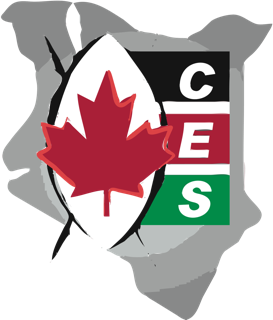Dennis Were – better public health for refugees
Note from CES Canada Chair Carl Friesen: I’ve had the privilege of meeting Dennis several times on my trips to Kenya. He’s the Vice Chair of our Alumni group and an inspiration to many of our students. Like most of our students, Dennis comes from a difficult family background, but CES was able to support him during his high school, our School of Continuing Education Leadership program, his undergraduate program, and currently, his Masters. Along the way, Dennis has been able to use the help CES donors provided, to build a successful career in Public Health. Here’s a lightly-edited transcript of a recent interview with Dennis, on Zoom.
My name is Dennis Kalasa Were. I’m with the Kenya Red Cross Society. I was part of the CES leadership program while studying at the Meru University of Science and Technology from 2015 to 2019, when I graduated.
I’ve been working for the Kenya Red Cross since 2021, now focused on Turkana County (a semi-desert part of north-west Kenya), a county that hosts refugees. I was posted there as a public health officer, supporting public health programs and health promotion in the refugee camps. I’ve been based in the city of Kisumu, Kenya for two years now.
Thanks to CES Kenya for their support through high school and university. I’m currently working on my Masters in Public Health. Through my work with the Red Cross, I’ve been able to work on my thesis, looking at non-communicable diseases and how they impact the population within the refugee camps serving people seeking asylum within our country, Kenya. They come from the DR Congo, South Sudan, Rwanda, Uganda and other countries. Some are fleeing conflicts in those countries or drought effects, or are looking for education and better medical care within our country.
I must appreciate CES Kenya for investing in me and ensuring that I'm able to further my studies so that then I can be able to support communities better. Now in the second year of my Masters, it is interesting that the skills available to us right now are the ones that are enabling me to do programming better, design and programs that serve our refugees better.
Some of the challenges that we are experiencing as we serve this population include the fact that there is a huge burden of non-communicable diseases within the refugee community. This is a discussion that is not really being taken with the seriousness it needs. That is why we've been calling our own partners, such as Kenya Red Cross that I work for, and other partners in the country, in collaboration with United Nation High Commission for Refugees that is advocating for better services, to provide good quality services while serving these refugees. Through my expertise and my skills, I have been able to work closely with these partners, ensuring that we're able to advocate for some of the emerging issues.
My thesis, which I'm working on in collaboration with the graduate department of Meru University, is about trying to understand what continuity of care looks like for this population. When I graduate, I can publish a document that can speak to my work, the challenges, the refugees, even looking at currently, what is happening in the neighboring countries, such as South Sudan, Congo and Rwanda. It’s already clear that we have a crisis that is active, a problem that is sort of time bomb that's about to go off, so it is very important for all of us to prepare.
And that's the work that I do every day. I help standardize the community to be prepared, just in case we are resource-limited. Then they are better placed to protect themselves and protect their loved ones. As a public health expert, we are monitoring the disease trends within these neighboring countries, for instance in Sudan, where we have a huge numbers of cholera and polio cases. Recently, just last year, we were having robust interventions around Mpox, but we have huge numbers of cases in the DR Congo and Rwanda currently. We've been tracking through our surveillance mechanisms to understand the prevalence of Ebola in Uganda, cholera cases in Sudan, and polio cases in Tanzania.
So, I'm able to advise the Red Cross organization, and other sectors, such as Kenya’s Ministry of Health, how to support not only the refugees, but also the host communities. The facilities we are running provide services to two populations – refugees and local people. Our work makes them better placed to be able to live a healthy life and be able to protect themselves.
Thank you so much to CES Kenya that they do and work with me, empower me so that I am able to design programs, and work with support communities.
After graduating with my Masters, I want to be able to not only support services within our country, Kenya, but also to advise the East Africa Region about what is happening across the region, and maybe the African continent. That is where I am planning to be, ten years from now.

